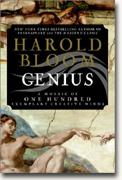Genius
Harold Bloom
book reviews:
· general fiction
· chick lit/romance
· sci-fi/fantasy
· graphic novels
· nonfiction
· audio books
· author interviews
· children's books @
curledupkids.com
· DVD reviews @
curledupdvd.com
newsletter
win books
buy online
links
home
for authors
& publishers
for reviewers

 |
Genius: A Mosaic of One Hundred Exemplary Creative Minds Harold Bloom Warner Books Hardcover 814 pages October 2002 |
|
Harold Bloom, Professor of Humanities at Yale, author of more than twenty-five books, and “America’s preeminent literary critic” has produced interesting essays on one hundred authors and collected his efforts in one grand compendium. In giving us pleasure through his wide panorama and sensitive critiques he also sponsors quarrels with the reader.
What defines a “genius,” or an “exemplary creative mind?” The central virtue can’t be originality, because Bloom omits the tragic Greek playwrights and scientific authors. Surely Sophocles, Euripedes, Aeschylus, Newton, Darwin, and Einstein revolutionized how humanity sees itself. Surely those writers were more original than Wallace Stevens, Arthur Rimbaud, and Ralph Ellison. Thus Bloom is inconsistent as to his selection criteria for literary figures and blind to some of the most generally acknowledged geniuses who ever wrote. The author admits he can’t define a literary genius except through “appreciation.” Apparently we should take his likings as definitive. By no accident, his nominations are what university professors in the past have called western civilization’s “canon,” with a few eastern additions. Bloom deplores attacks on the “canon” by feminists, ethicists, cultural analysts, and historicists but builds no intellectual edifice in support of ancient preferences. His “appreciation” is gained by “the God” within an author. He quotes with much approval writers who show “gnosis,” a “knowing,” and apparently feels that a wild spiritual or supernatural self-exploration is essential to good literature. “The Gods must return if canonical literature is to continue to be composed.” In praising imagination, he repeats the aphorism that “Fact is death.” What are we to do with this? Are we to give critics based in liberal arts faculties the right, without any objective criteria, to say that Ernest Hemingway was a literary genius but Tom Clancy is not? Our civilization is an analytical one and authoritarian judgments based on individual “feelings” and precedents seem wrong. And should we elevate off-the-wall and mad musings to goals for our young authors? The reading population would say “No” to both claims--note the decline in the marketplace of what editors educated in liberal arts nominate as “literary works.” The Proustian rhetoric of longing and hand wringing can’t beat the external reality of commercial fiction. Professor Bloom says: “we begin the twenty-first century with realistic doubts that any one writer ever again will be able to produce a literature.” Is this because Darwin is gradually destroying religious philosophy while neurology obsoletes imaginative psychology? Intelligent writers--and anyone with any hope of creating a classic must be intelligent--will surely have more and more difficulty defining the problems of modern characters. They must throw away God, the Father and Freud’s father and acknowledge the roles of genes and brain chemistry. Showing relationships and individual’s problems and letting the reader empathize should overwhelm diagnosis in transmitting understanding. And modern pharmacology will treat author’s madness and depression. Fact will triumph! Facit lux. Despite all this quibbling, this reader enjoyed the Genius. Professor Bloom writes well except on transcendental and religious topics, where the turgidness of the subjects is reflected in his own prose. And the quarrels led to valuable introspection.
|
|
|
|
 Click here to learn more about this month's sponsor! |
|
| fiction · sf/f · comic books · nonfiction · audio newsletter · free book contest · buy books online review index · links · · authors & publishers reviewers |
|
| site by ELBO Computing Resources, Inc. | |
 Who is a “literary” figure? Is the author of the Old Testament and is Muhammed, himself, literary, as Bloom apparently believes, because the first showed us fascinating characters and the Koran contains the speech of a character, God? Is character development—the central achievement of his greatest hero, Shakespeare--essential to “literariness?” No. Character-oriented fiction apparently isn’t necessary because Bloom includes such essayists as Montaigne and Emerson and religious thinkers like Saint Paul and Kierkegaard.
Who is a “literary” figure? Is the author of the Old Testament and is Muhammed, himself, literary, as Bloom apparently believes, because the first showed us fascinating characters and the Koran contains the speech of a character, God? Is character development—the central achievement of his greatest hero, Shakespeare--essential to “literariness?” No. Character-oriented fiction apparently isn’t necessary because Bloom includes such essayists as Montaigne and Emerson and religious thinkers like Saint Paul and Kierkegaard.